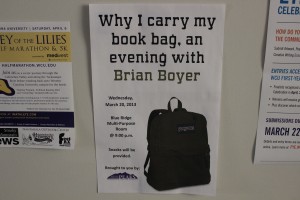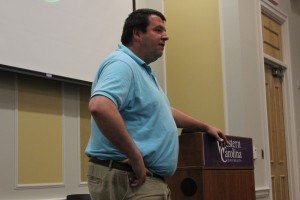On a night where emotions were high and silence drowned out the paralyzed faces of students, Brian Boyer stood tall to deliver a heartfelt and gut-wrenching story on impact and perspective.
Boyer, the residential case manager at Western Carolina University, opened up on his experiences with past students dealing with drug and alcohol abuse, but more importantly hit on the consequences of bad decision making. The program, which he pushes through each year, was entitled “Why I Carry My Backpack” and shed light on moments in his life that carried the heaviest of impacts.
Silenced filled the Blue Ridge Multipurpose Room as Boyer swept his glassy eyes across the blank expressions of students. At this moment, perspective rippled through the dimly lit room. Impact occurred.
Minutes before, Brian Boyer told these students about his backpack. Not just a backpack, but also a memory. Anytime he walked around campus, the straps of this backpack were tightly fitted around his shoulders and never out of his sight. The “what” had no place in the discussion, it was the “why” that pushed him to the brink and brought him back again. Again, impact.
The backpack belonged to a very close friend of his and was a student finishing up his freshman year at Appalachian. Tragically and unexpected, his friend passed away in an accident a week before Boyer started working at WCU in 2003. Specifics of the accident could not be published because of confidentiality.
The backpack looks old and worn. It is as ordinary as any other backpack. But the weight of what it carries can only be understood through what Brian Boyer wanted to say. The black color it used to be has dissipated over time and is wearing down. This is just what time does physically, but underneath, nothing has changed. The backpack is the same as it always was and Brian Boyer keeps that close to him.
“I want people to understand that backpack represents why I do what I do. I carry it to honor his memory and try to help students make the best decisions they can,” Boyer said solemnly.
Impact.
BACKGROUND
Brian Boyer graduated from Appalachian State University in 2001 with a mouthful undergraduate degree in political science with a concentration in city town and county management and minors in sociology and community and regional planning. Additionally, he received a master’s degree in college student development with a concentration in university administration, which landed him at Western Carolina University.
“I didn’t even know you could do this for a living or that student development existed as a career,” Boyer said. “I became a resident assistant halfway through my sophomore year at Appalachian, fell in love, and wanted to keep working with college students.”
In 2003, Boyer came to Western Carolina. Over the next eight years, he filled the residential director (RD) role at both Walker and Scott halls. In his second RD stint in Scott starting in 2007, he started the Western Carolina PEAKS program, which helps students transition from high school to university life by connecting them with other students and showing them the way to success at WCU.
After another four years, the university created the Residential Case Manager position and named Boyer to assume the role in 2011.
In addition to holding his university position, Boyer plays a large role in freshman orientation, open houses throughout the semester, CATCamp (a summer camp for incoming freshman), and the summer Academic Success Program (ASP). He doesn’t deal only with freshman, but he sees himself as a “guidance counselor” for the freshman class.
BAND OF BROTHERS
Boyer makes himself known all over campus, but one of his contributions to students begins in his Band of Brothers class.
The class stems from a man by the name of John Gardner, who has a reputation in Boyer’s field as “the man” dealing with first-year issues. When the PEAKS program was developing, Gardner came to Western to help put it in motion. During one of his workshops, someone asked him what was the biggest problem unaddressed by colleges.
“I am never going to forget what he said,” Boyer stated. “It was his opinion that colleges weren’t doing anything to help young men develop emotionally, and if they knew how to deal with their emotions, stress, and anger, they would do so much better in other areas because of that.”
Taking this to heart, Boyer made a class to deal with just that. The upbringing of Band of Brothers came about to be a reflective class for students to find out who they are, why they are that way, and what they are going to do to create a change.
First-year student Zach Kierstead, currently in one of the Band of Brothers classes, approached it with the right mindset and is receiving the greatest payoff.
“Boyer is an amazing person,” Zach said. “He is very good at making you think outside the box on realistic problems. His class is honestly how to become a man.”
FINDING HIS NICHE
Initially, Boyer had no intention of working towards a degree remotely related to college student development during his first couple years at Appalachian State.
“I wanted to be a pediatrician but I made a C in the easiest biology class I was ever going to take in college. So, I thought this wasn’t very realistic, “ Boyer said. ‘Then I was going to be a politician because I have the personality for it, but I realized I was way too nice and would be eaten alive.”
The trial and error approach Boyer used did anything but point him in the right direction until he tried his hand at becoming a city manager. Ironically enough, it turned out to be a boring desk job that did not sit well with a character such as Boyer. He did not settle. He had to be honest with himself.
“I sat down and asked myself what was the common theme. The common theme was I wanted to help people,” Boyer said. “I think I found that.”
The commitment of Brian Boyer to the university is second to none, but nothing has been handed to him. Unfortunately, much has been taken away.
BRINGING THINGS FULL CIRCLE
Brian Boyer not only opened himself up on that chilled March night, but brought perspective. He didn’t choose to speak because it was the right thing to do. He chose to speak because it was needed.
The students in the room saw underneath the teddy bear surface of Brian Boyer for a short time. Janina Dehart, director of the ASP program, has seen this soft and lovable side since she started working with him in 2003.
“Watching him interact with students, he is very passionate about his job and cares for them. One of the best things about working with him is that is rubs off on the rest of (the faculty) and reminds us to put students first,” Dehart said. “If we could just have an ounce of the same type of compassion that he does, I think we would be a lot better for it.”
Walking around campus, Boyer might not come off as the approachable type. This statement is anything but accurate. He is a role model to students, a friend. He has the respect of the students and it is that which keeps him doing what he does.
The road less traveled applies to Brian Boyer in more ways than many would come to realize. He has gone down a tumultuous path that repeatedly tries to catch him off guard and sideline him. But fighting is what he does, and it is what he will continue to do.
“Appalachian was very good to me and had offered me a job to stay, but I wanted to know that I could be successful somewhere else,” he said. “I think I found my answer.”
Brian Boyer came to Western Carolina looking to prove something to himself. Now, ten years later, the humbling man he continues to be has everything to gain and found a new home on the other side of the mountain.
“You have to have love from where you come from, but I am definitely a Catamount.”





